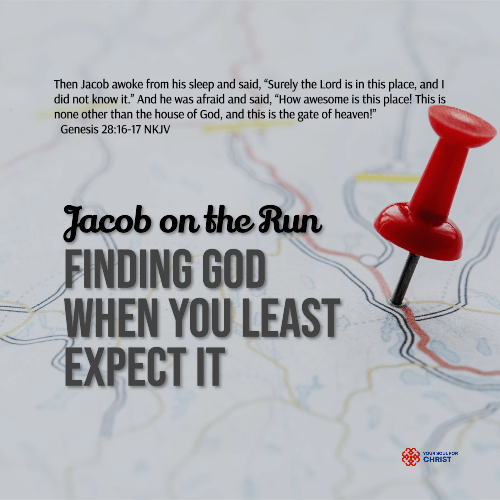Then Jacob awoke from his sleep and said, “Surely the Lord is in this place, and I did not know it.” And he was afraid and said, “How awesome is this place! This is none other than the house of God, and this is the gate of heaven!”
Genesis 28:16-17 NKJV
Jacob, the younger son of Isaac, seemed unpleased for not being the oldest. Perhaps, he considered himself to be living in the shadow of his older brother Esau. Esau, a strong and courageous hunter, was the favoured son of their father, while Jacob, who stayed close to home, was loved by their mother, Rebekah. Deep inside, Jacob longed for the blessing and inheritance that seemed destined for Esau. He desired the favour and power that came with being the firstborn, but his yearning led him down a path of deception.
Jacob’s desire for a blessing wasn’t wrong, but his methods revealed his human weakness—his tendency to manipulate and deceive to get what he wanted. Instead of trusting God’s plan, Jacob took matters into his own hands. With his mother’s encouragement, he disguised himself as Esau, deceived his father Isaac, and secured the blessing meant for his brother. Though Isaac was suspicious, he ultimately gave Jacob the blessing, passing on promises of wealth, power, and divine favour.
When Esau discovered the deception, he was furious, and Jacob, fearing for his life, fled. While Jacob succeeded in securing the blessing, it came at a great cost—he became a fugitive, separated from his family.
Jacob might have thought he had won, but he lost spiritually. He acted out of fear, greed, and impatience, failing to trust God’s timing. His deceit left him isolated and distanced from God’s presence. Jacob had been so focused on his own plans and schemes that he couldn’t see God working in his life.
As Jacob fled, he found himself alone, burdened by his actions. Although he had received his father’s blessing, he was running from its consequences. He had become so consumed with earthly pursuits and control that he had lost sight of God. It was during this flight, at a place called Luz, that Jacob stopped to rest. As he slept, he had a dream of a ladder stretching from earth to heaven, with angels ascending and descending. At the top of the ladder stood the Lord, who spoke to Jacob, renewing the promises made to Abraham and Isaac:
And behold, the Lord stood above it and said: “I am the Lord God of Abraham your father and the God of Isaac; the land on which you lie I will give to you and your descendants. Also your descendants shall be as the dust of the earth; you shall spread abroad to the west and the east, to the north and the south; and in you and in your seed all the families of the earth shall be blessed.
Genesis 28:13-14 NKJV
When Jacob awoke, he realised, “Surely the LORD is in this place, and I knew it not.” (Genesis 28:16). This statement reveals Jacob’s spiritual blindness. Jacob could not recognise God’s presence because of his evil plan which consumed him. God had been with him all along, but Jacob, in his self-reliance, missed it. Fear struck him when he realised the sacredness of the place. He called it “the house of God, the gate of heaven” (Genesis 28:17). However, he still remained limited in his understanding. His reaction was one of fear, not complete trust in God’s promise. Though this was supposed to mark the beginning of his spiritual awakening, his response clearly shows that he missed the mark.
Jacob’s journey teaches a profound lesson: pursuing earthly blessings through deceit and human effort distances us from God. His actions fractured his relationships and forced him into exile. While Jacob received the blessing, it came with years of hardship and personal transformation.
His statement, “Surely the LORD is in this place, and I knew it not,” reflects the spiritual distance he created for himself. In his quest for what he believed he deserved, Jacob became blind to God’s presence and plan for him. This blindness is similar to Saul’s pursuit of David in 1 Samuel. Saul, driven by jealousy and fear, sought to kill David, ignoring God’s anointing. Like Jacob, Saul acted out of his flesh, trying to control his destiny through manipulation. In contrast, David often sought God’s guidance and trusted in His timing, even when faced with opportunities to seize power.
In conclusion, Jacob’s story is a reminder of the dangers of seeking blessings through fleshly means instead of trusting God’s presence and timing. His initial blindness to God led to unnecessary hardship. Eventually, he came to a turning point to recognise and rely on God’s guidance. Like Jacob, we often get caught up in our own schemes and fail to see that God is with us. Yet, God’s grace is always present, calling us back and offering us the true blessing of His presence. God is ever-present, even when we don’t recognise it. We must learn to trust in His timing and avoid relying on our own strength, for His plans are far greater than anything we could devise on our own. Let us strive to live in awareness of His presence and trust Him completely.
